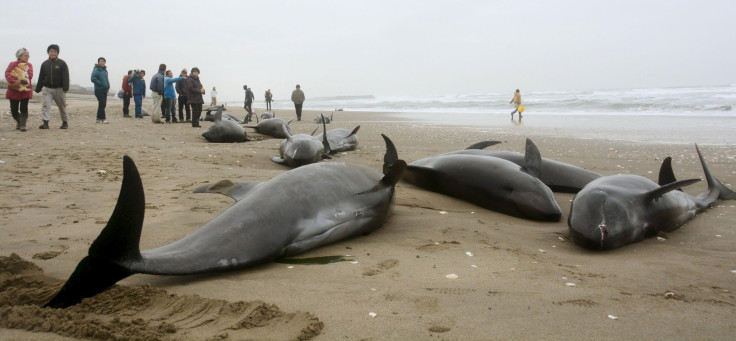Japan Netizens Anxious Over Whales Mass Beaching, Claim It Foretells Impending Quake

Japan recently experienced a mass beaching of over 150 melon-headed whales along its shores. It would perhaps had just been regarded as simple national news had not for some online commentators claiming the same thing had happened before the great undersea earthquake and tsunami struck the country that killed over 18,000 people four years ago and triggered a nuclear disaster.
Scientists who had dissected some of the bodies of the giant water animals said they have found none so far the reasons for the beachings. The creatures were found on two beaches on Japan's Pacific coast on Friday. Tadasu Yamada, a senior researcher at National Museum of Nature and Science, told public broadcaster NHK they didn’t see signs of diseases on the animals. The melon-headed whales are a member of the dolphin family and are usually found in the deep ocean.
The absence of an immediate, logical explanation on the cause of their deaths sparked a flurry of comments on social media. Most pointed out the beachings foretell of an impending quake.
"Is the next one coming? Be ready for a quake," Twitter user maoeos40d wrote. There was even one Twitter user who said the big quake would happen “on the 12th [of April].” Online commentators alluded to the same beachings that occurred before the great Tōhoku earthquake and tsunami struck on March 11, 2011. They said that at the time, 50 melon-headed whales had showed up on Japan's beaches six days before the monster quake.
The March 2011 earthquake started with a magnitude 9.0 (Mw) undersea megathrust earthquake off the coast of Japan. The earthquake triggered powerful tsunami waves that were 40.5 metres (133 ft) high. It went as far as up to 10 km (6 mi) inland.
An unidentified coastguard official quoted by the AFP said Japan is used to seeing one or two whales getting washed ashore a year. “But this may be the first time to find over 100 of them on a beach."
To report problems or to leave feedback about this article, email: e.misa@ibtimes.com.au.






